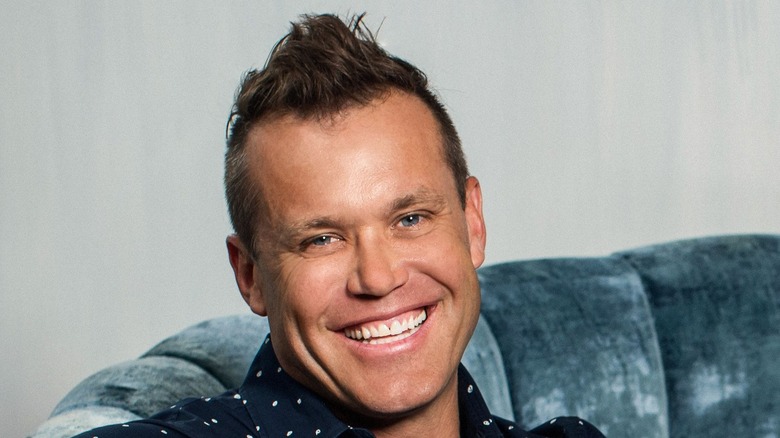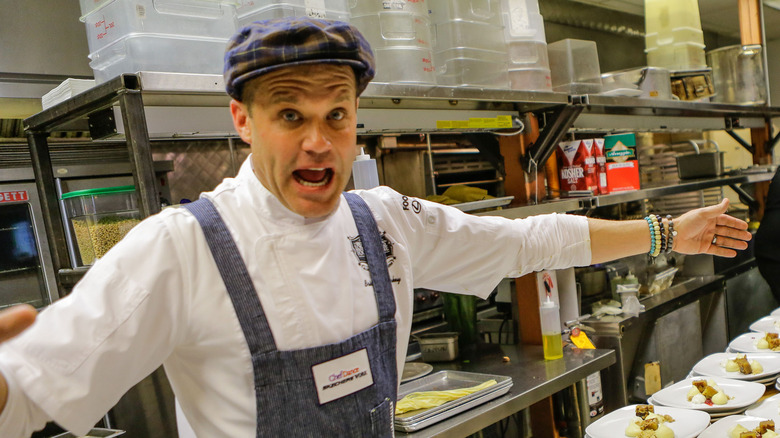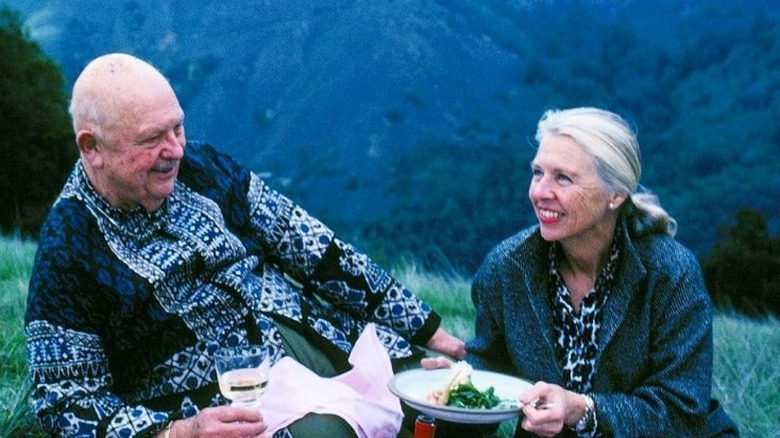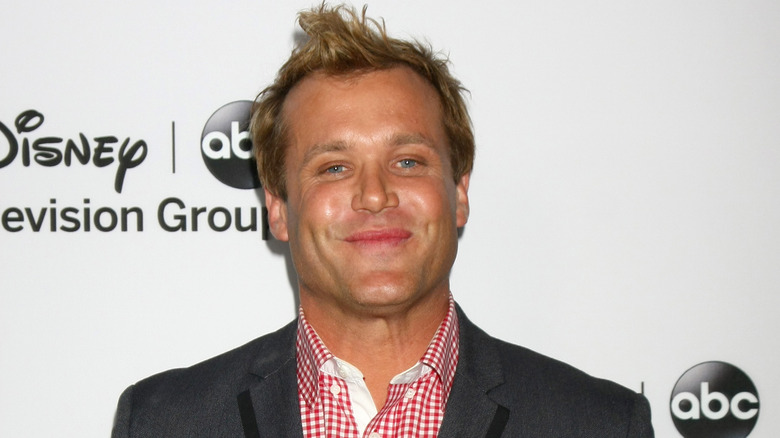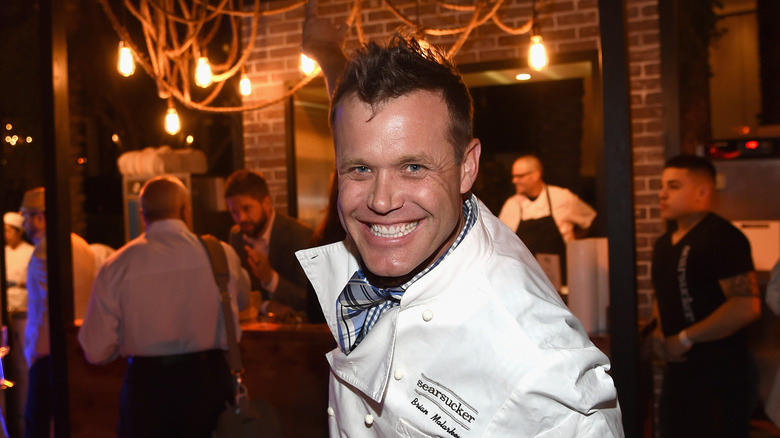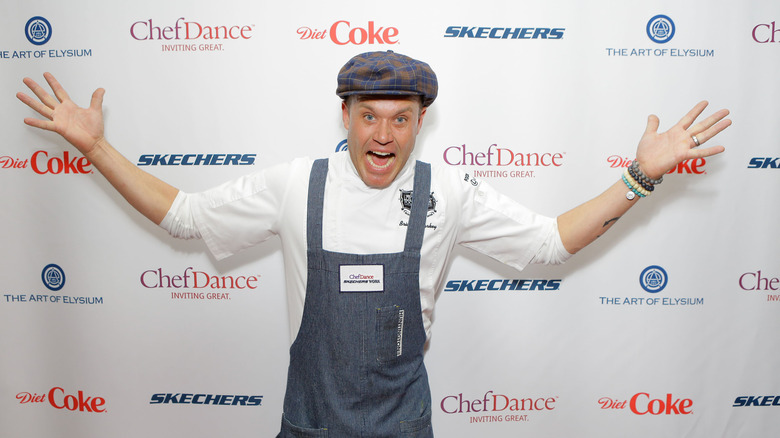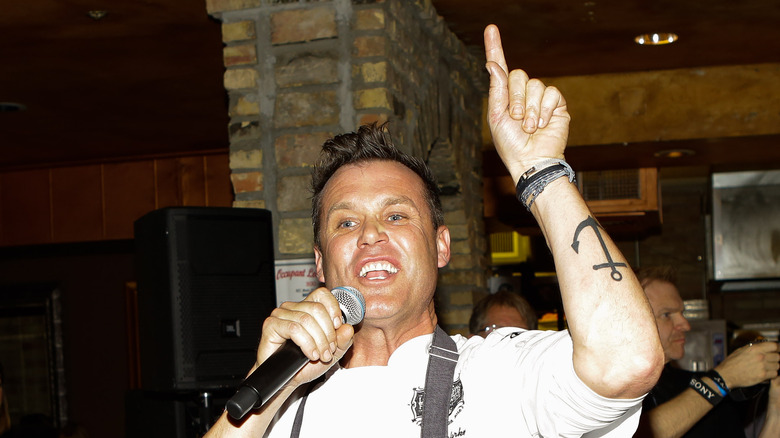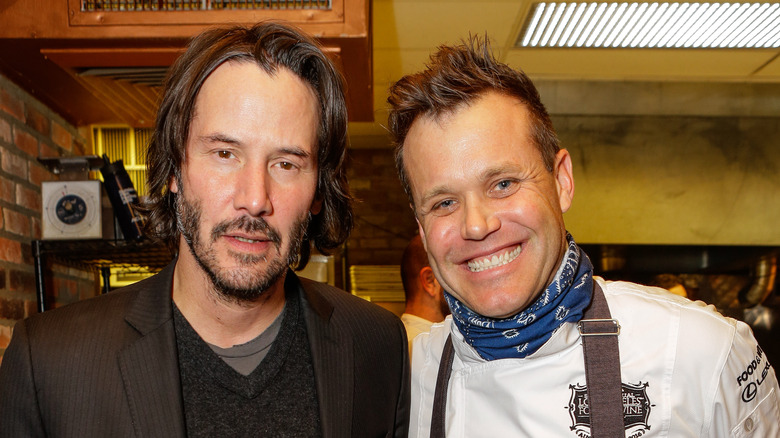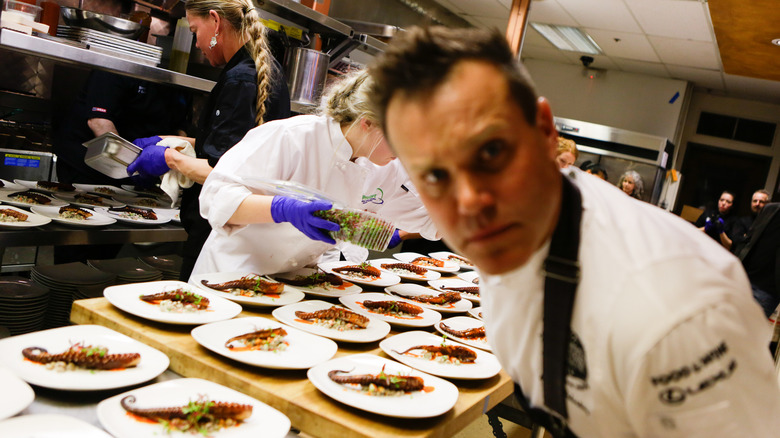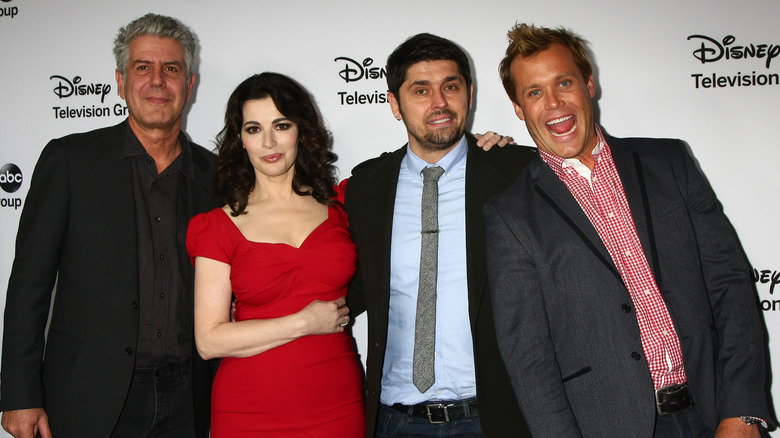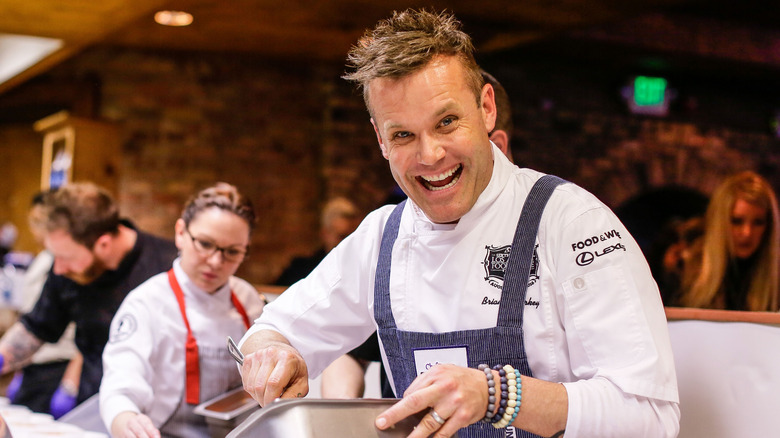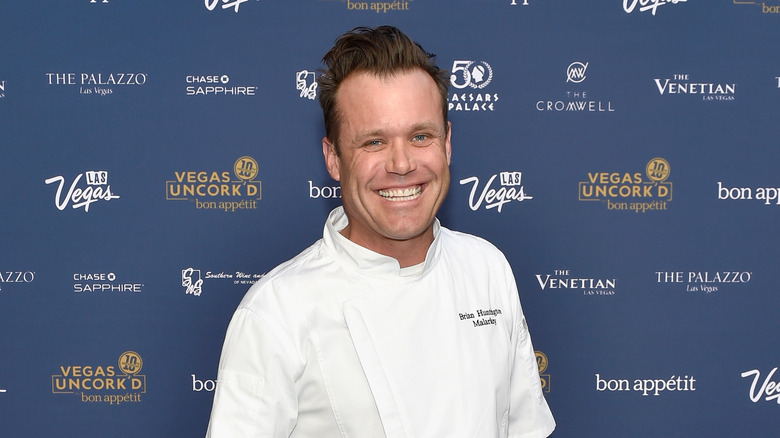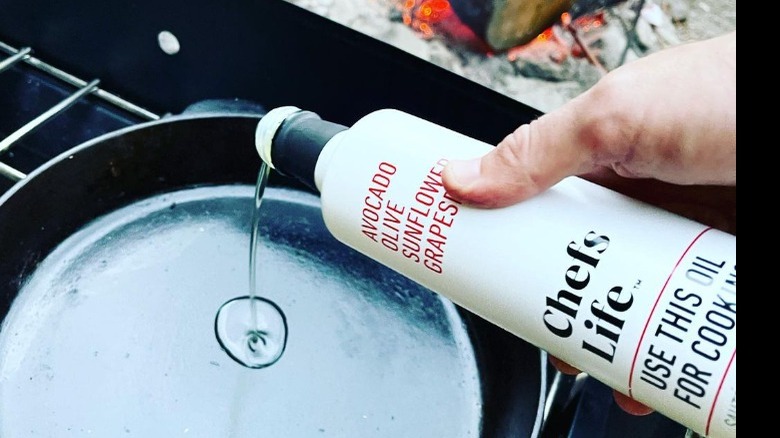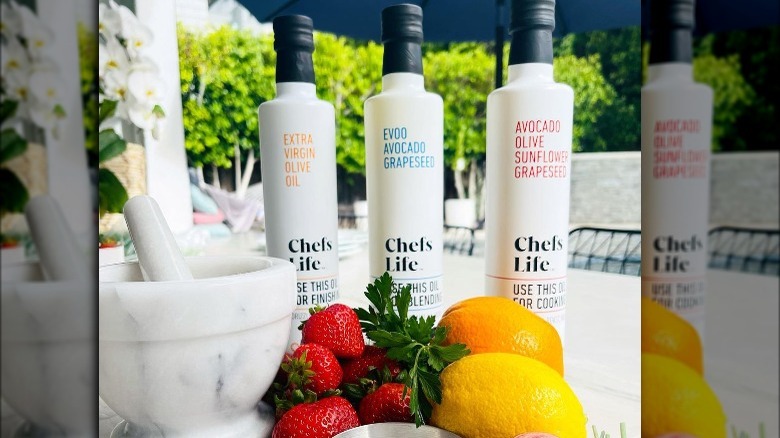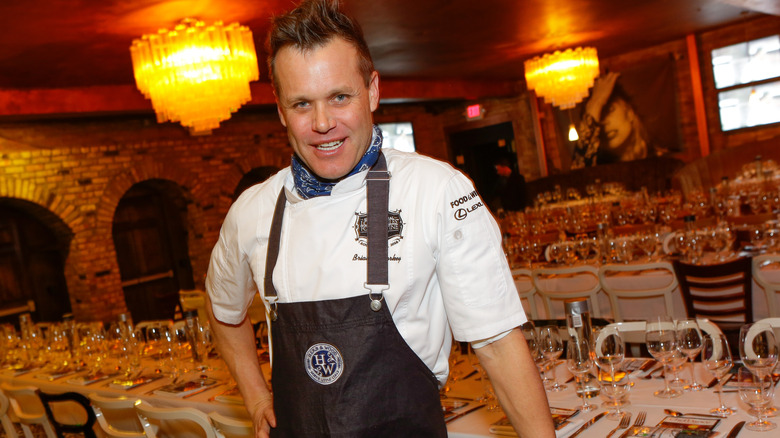Brian Malarkey Dishes On Top Chef And Guy's Grocery Games - Exclusive Interview
You think you know everything there is to know about Brian Malarkey already, right? You've been watching the California-based celebrity chef make a ruckus on your TV screen since 2007 when he first competed on "Top Chef" (via IMDb). You've since seen him chill with Anthony Bourdain and Nigella Lawson on "The Taste," which — yes — is one of his favorite memories, too. You've watched him chum it up with Guy Fieri on "Guy's Grocery Games." You've witnessed him trying to "Beat Bobby Flay." (Turns out, his first meet-cute with Flay didn't go so well, as Brian Malarkey revealed to Mashed. You'll have to wait a spell for that story.) If you're lucky, you've eaten at one of Malarkey's wildly successful restaurants, for example, ANIMAE, which The San Diego Union-Tribune gushes, "breaks all the rules."
If you think you know Brian Malarkey, the pandemic gave the celebrity chef a chance to get to know you. When Malarkey began giving cooking classes via zoom, he got glimpses into our everyday kitchens, which is why Malarkey's now focused on being "oil people." "I know what high heat cooking is," the chef told Mashed. "It's any cooking. It means you turn on fire. Right? But people are like, 'Oh, I don't high heat cook. I just sauté.'" In this exclusive interview Malarkey spills on and how your cooking blunders inspired his new oil line, Chefs Life. He also gives us new and surprising insights into his cooking career and "Top Chef" journey.
The real story behind Brian Malarkey's unusual mascot
We really want to know about your lobster, Diego.
That was ages and ages ago.
He traveled 3,000 miles from Canada.
Yeah, he traveled 6,000 miles. So a funny story. This is probably 15 years ago, I had a photo shoot coming up, and I had heard I was going to get the cover of San Diego Magazine. I was really excited. And I was the seafood chef of San Diego, [so] I had to make that shoot extra special. I called up one of my purveyors on the East Coast, and I said, "I need the biggest lobster you can get." And because you can only harvest the lobster five pounds and under in the U.S. on the East Coast, they went to Nova Scotia and got me an 18-pound giant lobster. Right? They shipped it to me. I got out of the box, and this thing was just absolutely huge. I put them in my little lobster tank at work at the Oceanaire, where I was working.
And we took a down, and we did a photo shoot with him and a giant white sea bass from San Diego that I had — [the sea bass] was not alive. And one of my sous chefs, Tony Torres, I remember he brings me this big lobster and there's pictures of me with the giant lobster. We put him in a little tide pool right by the beach, right, to keep him fresh. And we're shooting these other shots of the fish coming out of the water, really corny stuff. And I look over, and Diego's halfway into the Pacific ocean. I was like, "Oh my gosh." He doesn't even have a name yet. And I'm like, "That lobster, Tony. We're going to ruin the ecosystem of California because all of the local lobsters are going to mate with this giant lobster from the East Coast, and who knows what we're going to create."
So we thought about he almost escaped into the Pacific ocean. We got him back to work, and then every night I would parade him around the dining room on a big platter. Well, all the guests and all the staff started falling in love with him. They nicknamed him Diego. He did two morning shows with me also. I took him to the local news and like, "Oh, what are you cooking?" And I'm like, "I brought lobster." He made two TV shows or two newscasts. He made the San Diego Magazine, and he also almost escaped into the Pacific ocean, and he walked around for about two and a half weeks in the busiest seafood restaurant in San Diego, and didn't get eaten. Right? Rather than buying him to eat, the guests started giving me money, going "Let's save Diego. Save Diego."
So I had our event coordinators start calling aquariums. [They] started calling California aquariums. Nobody wanted him, right? We called Oregon, Washington, Idaho, Colorado, Mississippi, blah, blah, blah. The only aquarium that wanted him was the Maine Aquarium in Portland, Maine. Because they couldn't harvest lobster that big, and they wanted a big lobster. We boxed up Diego and mailed him all the way back. He came 3,000 miles this way, 3,000 miles that way. And he lived for years in the Maine Aquarium.
When Brian Malarkey's grandmother burned water with James Beard
You grew up cooking with your grandparents. We were wondering if you can remember something that they taught you about cooking from a very young age?
My grandmother loved to cook, and she actually was friends with James Beard. James Beard grew up in Portland, Oregon. He lived in Portland, Oregon, and had a place on the Oregon coast where all the Portlandites would go hang out. And [my grandmother] was a very elegant, very sophisticated lady. They all ate very formal dinners and fancy dinners and stuff like that. But what she taught me the most, I think, was that she had a garden, right? And she grew her herbs. She grew her berries. She grew carrots. I had never seen that. I grew up on a ranch where we grew beef, lamb, and whatever. So watching her, and she'd send us out to pick all the blueberries, pick all the raspberries, and then she would make jams. She would jar and can. And those things were really cool to watch and understand. Then, of course, we'd celebrate with making pies. Fun stuff. But it was all about the art of preserving and using the natural landscape. When we'd go to the Oregon coast, she send all the grandkids out to pick blackberries, and we'd return with all the blackberries, and she'd make us a big blackberry pie. It was really fun to watch that process.
She was friends with James Beard. Did you grow up with James Beard on your radar?
I had never met James Beard before in my life. And so, my mom always laughs. She goes, "I see your stories, Brian. You know you didn't know James Beard?" I never said I did. I said my grandmother cooked for him. And my father told a funny story. He said, "Your grandmother was one of the best cook chefs I've ever known in my life. And she said when she would cook dinner with James Beard, she would burn water. She got so nervous, she would just like melt down." But they cooked a lot together on the Oregon coast.
Brian Malarkey's first TV audition didn't go as well as you might think
Can you tell us your audition for "Food Network Star" where you had to audition in front of Bobby Flay?
He was my James Beard at the time. And that's way overextending any accolades to Bobby Flay, I'll tell you that right now. But I did. We shot a silly video because they were doing "The Next Food Network Star." Some guy had won the first season. He had this blonde spiky hair and went on to do a couple of different TV shows. I can't remember his name, but he drives around like Roadsters and travels to all these diners, and drive-ins, and dives. And I was like, "Wow. That guy's killing it." I waited until like Season 3 or so when I submitted a tape, and they said, "Yes, we would love to get you in for a formal audition." They flew me to New York. And I remember just being so excited. I was going to New York to go to the Food Network ... and I was just so excited. I was going "God, one day I want to be able to travel for my work. This is like the coolest thing ever, going to New York and having fun, eating in some nice restaurants."
Well, I went in there, and there was a bunch of executives, Bobby Flay, the whole team. I'm literally on a soundstage in Food Network. And they're like, "All right. Cook the dish for us, and tell us what you're cooking as you're cooking it. Right. Explain [it] to us." I was just like I got befuddled. I got nervous. I was just like, "Oh my God." And I knew I had just done horribly on it. Right? I was like, "Ugh." I flew back home. I got a call saying, "Nah, we just don't think you're quite right for the show." I was like, "Oh, man. Well, whatever. I'm still a good chef." I'm just going to give up on this whole public persona or this whole ambition of TV chef. Right?
How Brian Malarkey bounced back from his failed audition
What happened after the audition?
And a few days later, there was a Liver Foundation Dinner at this Omni Hotel. The Liver Foundation Dinner was where it was like 20 of the best chefs in San Diego. We each got our own 10-top table. And [we got to decided] whatever we wanted to decorate the table like, whatever we wanted to cook for that table, and each of these guests paid X amounts for the Liver Foundation. So we had to build little sub kitchens outside the hotel, cook all the courses. We had to bring our own servers, our own plates, our own glassware, our own cocktails, our own wine. It was a horrible ordeal. Right? A week earlier right before I'd gone to New York, the chef from the Omni said, "Malarkey, what are you cooking for your table?" I was like, "I don't know. Something good." And he goes, "We're going to kick your ass." I was like, "What did you say?" He said, "We're going to kick your ass." And I was like, "It's a competition?" I was like, "Ho, ho, ho. I had a lot of competition."
I traded another chef to get an outside ... table, so that I was on the far edge of all the tables in this big ballroom. Right? I had traded a tin of caviar to this guy to get this table. I came up with this whole idea. It was kind of like lions and witches and dragons. Right? And so I got my whole thing [together]. We had huge branches of trees that ... that are like 10 feet tall, and there's lanterns and stuff hanging off of [them]. We had big, giant platters. My GM had this big [spiel], like he'd read the menu, "Ladies and gentlemen, your first course will be ..." And my servers [were] Marie Antoinette and a court gesture. Then, I had these two girls that were dancing with scarves and doing this whole thing around the table. I had this giant [prop] I'd borrowed from a local theater company that was a lion's head. And I came out with that, "Roar." And the plates were long — it was big meat, like everything, everywhere. And the whole room was looking at us going "Oh my God. I want to be at that table." You had chalices and goblets. And we were laughing and having so much fun.
The time Brian Malarkey almost set a ballroom on fire
How did the Liver Foundation Dinner go?
I was working at the time at the Oceanaire. And the Oceanaire was famous for their Baked Alaska. Ice cream — hurray — [I lit it] on fire at the table. Well, that chef came up to me, and he goes, "Malarkey. I heard you have fire breathers here. If you light anything on fire in my ballroom, I will throw you out." And I said, "You said it was a competition, man. Come on, what's going on?" He said, "I will throw you out, Malarkey." I was like, "Whatever." Well, I'd been to Home Depot a few days earlier. I had gotten one of those big orange street cones, right, stuffed it full of ice cream, refroze it, cut it off, arranged that whole thing. So I had about a 2-and-a-half-foot-tall Baked Alaska.
And I — at the end of the meal — I was like, "Well, you only live once." Those girls with the scarves, were actually fire breathers. They actually had long finger-things that we dipped into their burning liquid or whatever. Right? And we came out, and I had people hidden with their water buckets in case anything went wrong. We went out there, and we lit everything in a fire. The girls' pants were on fire, I was like pouring fire over this Baked Alaska. And all of a sudden security pours in from all the entrances. And I was like, "Oh, sh**. Oh, no." They literally, like in the movies, grabbed me, took me out. And the whole room was screaming and cheering, just like, "Yes, yes."
They took me down to the loading dock and threw me out the loading dock just like in a movie. And we laugh. I met my whole team down the block, and we went to a bar. We just laughed and laughed. It made the newspaper the next day, like a little society section. "Malarkey thrown out of the Omni for lighting the ballroom on fire." A couple of days later, "Top Chef" calls up. Somebody from "Top Chef" says, "Are you the guy who lit the ballroom on fire?" I was like, "Maybe." They were like, "Want to be on 'Top Chef'?" I didn't even apply to "Top Chef". They just heard about this crazy guy that did this stuff. I got cast on "Top Chef" through that.
The first time Brian Malarkey almost got eliminated from Top Chef
Talk to us about "Top Chef." You're not in your own kitchen. You don't have your own tools. You don't have your own setup. What's it like cooking trying to perform the best you can in a highly televised setting?
Well, when I did "Top Chef" the first time, you don't have the confidence that you do later in life. But "Top Chef" gives you massive confidence if you do well, right. It lets you know that you can compete and hang with the top talent in the country. So, I was just a dumb guy working at a chain seafood restaurant at the time that liked to have fun and could cook good food. I almost got kicked off on my very first episode. The very first episode, this is Season 3, Miami, like 2008 or something like that, maybe 2007. The very first episode was exotic surf and turf. The iconic Anthony Bourdain was the guest judge. And I was late in the draw, and there wasn't much left. So I figured "ah, I might as well go for it." I pick a rattlesnake and eel, and Bourdain looked at me and goes, "You're my boy." I was like, "That's incredible."
I just went for it too hard. I had too many components. I had a bento box with four different dishes. We had fries with eyes, which was the loins of both of them, deep-fried tempura. I had the electric venom broth. I had ... the loins, I had rib .... There's cameras, and there's intensity, and there's time. And you're just like, "Oh my God, what is going on?" You don't know where things are at. You're grabbing pans. And you're all cooking in the same area. It's just wild. And all of a sudden, [Padma Lakshmi's] like, "Two minutes." I'm like, "Two minutes. I need like 10." I got half my ingredients on the plate. I'm like, "I'm going to get kicked off on the very first episode. This is horrible. Like how embarrassing is that?"
Thankfully, somebody really made a bad dish, and I didn't get kicked off. And I came back, and I won the next two episodes, thank God. But it takes a while to figure out how to do that competitive cooking. It's a whole 'nother world. It's not about making the greatest dish. It's about making a solid dish. Because nobody under those conditions can make a great dish. You just need to make a dish better than everyone else. Everyone's going to have faults. Everyone's going to make mistakes. Everyone's going to do shortcuts. Everyone's going to have little accidents that they have to cover up, or whatever. So it's just how do you get around those things. Now that I've been doing it for probably 12, 15 years, I'm really, really good at competitive cooking.
Rules Top Chef contestants have to follow, according to Brian Malarkey
You went back to "Top Chef" in 2020. What did it feel like to step back into that highly stressful situation again?
I like to run a marathon about every seven years, right? Because I figure it takes me about seven years to forget how awful the last one was. Same thing with "Top Chef". It took me that long to forget how awful it was. When you're on "Top Chef", they take away your wallet, your cell phone. You don't get to read books, magazines, TVs, no radio, nothing. It's just silence. And a lot of silence. Right? If the cameras aren't rolling, you can't talk to other people. There's so many things, because if anything happens, if I say "I don't like you," and they didn't get it on camera, it didn't happen. You know? You can only talk when the cameras are rolling. It's just extremely stressful. Extremely long days. They made challenges that are meant to break you. They're really trying to break you.
And it's not a cooking competition show. It's a reality TV show. You don't get to go home and relax. You have to have cameras wake you up in the morning, cameras put you to bed at night, cameras watch you walk into the bathroom, cameras watch you make toast. It's really crazy. And then, I signed up for it only I wanted to prove myself. Because I had been cooking so much on the Food Network: "Guy's Grocery Games," "Chopped," "Beat Bobby Flay." I've done them all, right? I was like, "Oh, I'm so much better now than I was then." And I have a massive amount of confidence now, which I didn't have then.
What it was like for Brian Malarkey to go back on Top Chef in 2020
What did that feel like the first day you stepped back on the set?
The very first day, we all check in, they take away my wallet, my cell phone and stuff. And I was like, "Oh, there's only one way out of this world. And you either make an a**hole out of yourself or you win." Fourteen of us are losing, one person wins. I was like, "Oh, this is horrible." And what happened? The very first competition, I'm in the bottom again, not because my dish was bad, but because my teammates had two bad dishes. Our team was in the bottom. Somebody [from] my three-person team was going home. And I was very confident it wasn't me, but I was just like, "Ugh." I did not want to be in the bottom of the first round again. But then I picked up momentum, picked up speed, and finished strong again. So, it's fun. It's more fun and more stressful when you're cooking against all these seasoned professionals that have been doing it like I have.
What's your diet like when you're on a show like that. You're making incredible food for the world to see. What are you actually eating?
It's so bad. We can't eat each other's food, because they don't want us touching each other's food. Right? You get a little bite here and there, but for the most part, you're just getting to-go food from local restaurants. They actually did have a much, much bigger budget on this season then they did 17 seasons earlier, 14 seasons earlier. So, we did get some good sushi and good Indian food and stuff. But, for the most part, you can't let the food dictate your mood and your energy levels.
I just ate a lot of nuts and seeds and bananas. and in my first season, there was so much drinking and indulgence. Because everything was free and we were young and it's fun. You're like, "Oh, whatever." You didn't really understand the repercussions of the cameras. You know? And you're like, "Oh, it's two o'clock at night, and we're about to be judged. I'll drink three glasses of wine." You're like, "Oh no." Now we're all professionals. We're much smarter. So, everyone's like exercising, healthy, not drinking. Hardly anybody drank on the set. It was like, this is serious business. And we were all really just trying to be as healthy and focused and ready to roll at any time.
Brian Malarkey's favorite food competition might surprise you
You have been, like you said, on "Top Chef", "Guy's Grocery Games," "The Taste," "Chopped," "Cutthroat Kitchen." You've even done "Real Housewives."
I did "The Taste" with Anthony Bourdain. That was fun.
Do you have a favorite memory from all of your experiences?
Just hanging out with Anthony Bourdain for six weeks was pretty fun. It was Ludo [Lefebvre], Nigella [Lawson], myself. That was ABC prime time. The budget was insanity. We had our own stylist, our own driver, our own trailer ... I was like, "Whoa." ... My team won that year. I became the voice of "The Taste." Then, I guess that didn't work out well, because I got fired after the first season. Marcus Samuelson replaced me. I think my favorite part [of these shows] is, later in life now, is having my kids watch it, and just make fun of me. Like, "What were you thinking, Dad? What were you thinking?" Oh, "I would've done this. I would've done this." I was like, "Yeah, but in the moment you're like well, I don't know what I'm going to do."
But I love, love, love "Guy's Grocery Games." Because it's an afternoon. You're having fun. You're competing against your friends. They make us all the little B-level celebrities all have to compete against [ourselves]. And we play for charity. It's just so much fun. The grocery store's fun. And Guy's fun. And the challenges are fun. Win or lose, you had fun. Then, you all go to dinner at the end of the night. That's the best one. Your ego gets put away, and you're friends with the judges, you're friends with the other chefs. It's up in Santa Rosa or Healdsburg now. So, you're hanging out with Guy. Those are just so much fun, and [it's] such a cool, unique family behind the scenes. Everyone knows everyone. It's just so much fun.
The advice Tom Colicchio gave to Brian Malarkey
You talk about your kids watching your old shows. There's this urban myth that chefs and families and relationships don't mix well together. What's the secret to your success?
Well, I'm very, very fortunate. And I'm not the day-to-day grind chef. I'm very fortunate that we have successful restaurants that can all afford their own chefs. I surround myself with people much more talented than myself, great young talent, and like Carlos Anthony, who runs our Herb & Wood. He's winning a whole bunch of cooking competition shows on the Food Network lately. He just won "Chopped Next Gen." Our sous chef there just finished second on "Chopped Next Gen." Tara Monsad, our Filipino amazing chef at ANIMAE, is going to win every award there is. She's just the most talented thing going. We have Sarah Harris up at Herb & Sea who's like 30 years old, who just is a new incredible talent.
I don't go butcher fish anymore. I don't do inventory. I don't close a restaurant. I don't open a restaurant. I don't hire people. I am very, very fortunate in the fact that I put myself in a great position. I can go surfing in the morning with my kids. I go to their baseball games. I can do those things. And I'm 48 years old. So many chefs don't commit the early time and energy. I overworked myself before I had kids. I worked six days a week, the 12, 14 hours a day so that I was in this position later in life. I used to love the grind. And the only way I can run the company now is I know when they're doing something wrong. I'll be like "Their food cost is high, because, what's your cost on that item? How much [did] you sell it for? Who'd you buy it from? How long did you hold it? What'd you lose? What'd you steal?" I learned all of those [things].
Tom Colicchio actually said something to me when I was on the early season of "Top Chef". He took all of us aside and he said, "Guys, I've watched the first two seasons of 'Top Chef,' and you guys are going to get a little fame going on right now." Right? He said, "I saw a lot of people run off and open restaurants and do stuff that were way over their league." He said, "Do not leave your job you currently have until you know you can make somebody else money. So that when you do it yourself, you're able to make a career out of it." And a lot of people, they get that instant fame. Somebody offers them a big, fancy job. They don't know how to deal with people properly. They don't know how to deal with press. They don't know how to [calculate] food costs, labor, HR, PR, all of those things. And then, they flop ... The majority of the "Top Chef" people have opened and closed so many restaurants, or they didn't stay stable to their own restaurant.
Brian Malarkey talks the pandemic and his restaurant empire
You talk about Gingham as the restaurant that got away from you. Are we going to see another Gingham in the future? What's next for you?
Oh, more than that now. Again, we had all the fabrics. We had Searsucker, which was new, American classic. We had Herringbone: Italian fishing village. We had Gabardin: Portuguese seafood bar. We had Burlap: Asian cowboy. We had Gingham: barbecue, and fried chicken. That was fun ... We were moving so fast, we couldn't build the culture. In order to get a restaurant that becomes iconic and lasts more than three years or two years or five years, it has to have culture, so that everybody from the dishwasher to the busboy to the barbacks, the bartender, the server, to the managers, they all have a common goal, a common passion, and a common identity. That takes a few years to build ... and it takes forever to maintain.
We're opening these concepts because everyone was throwing so much money at us. They were so excited because a restaurant always starts strong, especially if you have a name connected to it. Our Searsucker restaurant was doing 10 million a year. Open another one, Burlap. ... But [after] six months [of] inconsistency in service and food, they start going [downwards]. And when these things start nose-diving, you can't pull them out there. They're going downhill quickly because they've lost the culture. I was able to sell those concepts, and I was very happy about that. I no longer have those, but I helped open restaurants from Cabo to Hawaii, to L.A., to Vegas, to Austin, to Arizona. So, we opened a lot of restaurants, but now we have a new slate where we brought in the culture and we run the timing.
So, we just have Herb & Wood in Little Italy, Herb & Sea in Encinitas, Herb & Ranch in Orange County, and ANIMAE downtown. We were about to sign two more leases, one in L.A. and one in Orange County. And we're like, "We need to just sit back, take a year off." We haven't had a year we haven't opened restaurants in 15 years, or 12 years. Right? So my business partner and I said, "Let's just sit back, really define who we are, get through this thing that's happening out there." Because we just closed the restaurant this weekend for the weekend, because of an outbreak. It's a bad time to open new restaurants because we don't know what the future looks like. We've lost a massive part of our industry support system, our people. People now don't want to be line cooks anymore. People don't want to be servers anymore. Why? Because it's inconsistent. People are looking elsewhere for jobs. The future's very foggy right now.
So we're just sitting back. We're letting the world or the country or our community, our neighborhood tell us what they want in the future. But we're in no hurry to open anything right now, because of the uncertainty. Now, we're just focused on being an oil people.
Brian Malarkey on how the pandemic turned him into an oil person
You got the idea for oils by teaching Zoom classes during the pandemic. You said that you looked into the people's kitchens and realized nobody had any idea what they were doing with oils.
As soon as the pandemic hit, we had to lay off all of our employees. We laid off about 500 employees. So we started an employee relief fund. My business partner, Puffer and I, there's nothing we hate more than going to other people's houses and cooking them dinner. But we know that they sell for a lot [at] charity auctions and stuff. So, we started doing packages. People come to my house. We'll go to your house. We still haven't collected on most of those because of the pandemic, but we owe a lot of people a lot of dinners. We were able to raise $100,000, which is not much in the scheme of things with 500 employees. But at least it made us feel good. One of the ways we did that was we started doing these online cooking classes: 50 bucks, here's your ingredient list, 100 people. We did cooking classes. Then, it turned into a big business. We actually started a company called Chef in a Box, inspired by the wonderful CFI Justin Timberlake on "Saturday Night Live."
We actually started shipping — we still do ship ingredients all across the country now. Now [the classes are] corporate. Now they're $25,000 a class. You get the ingredients, you get a hundred people. But what I did learn is that I would talk to people in their own kitchen, and I'd be like, "What kind of range do you have? What kind of pans are you using? What kind of oil are you cooking with? What kind of salt do you use?" I never had been invited to people's houses before. Because the irony is, you know who the least inviting person to a dinner party is?
A chef?
A chef ... I never ever get invited to dinner parties, because I think people are scared or intimidated. But if you give me a hamburger or a roasted chicken breast — Well, I'd be pissed at you for roasting chicken breast. But, I don't get invited to home parties not very often. [With the classes] I got to go to people's houses. I realized that nine out of 10 people said they cook with extra virgin olive oil. I was like, "Guys, you're not supposed to cook with extra virgin olive oil." There are so many alternatives. There's avocado. There's the second pressed olives. There's grape seed. There's sunflower. You can do the peanut, but you'll kill somebody. Canola is not bad, it just has a bad stigma. Right? So, I started thinking. And I'm going to the grocery stores, and I look at the oil section going, "I am a chef and I have been a chef my whole life. I don't understand these oils. There's so much information on it that doesn't make sense to me."
Brian Malarkey's top tips for working with oils
What do we need to know about oils?
I realized that the oil doesn't make sense. The bottles were all kind of old and stodgy and green, and really just like eh. And I love, love great extra virgin olive oil. I understand the crap out of extra virgin olive oil. It's like fine wines. You can taste the differences in the regions, the minerals, and the grasses of extra virgin olive oil. But extra virgin olive oil is a highlight. It's just something you put on at the very end to add. It's like sea salt on a nice grilled piece of vegetable, that nice steak. You enhance at the end. Right? It's not what you use for making your vinaigrettes or anything either ... Extra virgin olive oil is so strong. It's kind of like a buttery Chardonnay, which has a point and place. But it's not your day drinking wine. It's a wine that you pair with a nice scallop or nice seafood or something that's got some acids that reflects off the butter. It's such a bold flavor. If I drank a buttery Chardonnay in the middle of the day, I would die. Right? You want something crisp and alive. And if I'm doing like a wine-paired dinner. That's where I want that buttery Chardonnay or that you know.
Give our readers your top two tips for working with oils.
I find that most home cooks don't turn the pans up high enough. If you're sautéing, you have to use medium-high, no less, right? Because when you put food into the pan, it brings the temperature down. You have to have it so hot that it's able to maintain its heat. And a thicker sauté pan is always important also. I love cast iron. But caramelization in anything, a fruit, a vegetable, a protein, is where the umami flavor is. It is through char and caramelization of the natural sugars — and everything cooking super hot is what makes flavors so much better. Home cooks are scared to turn their ovens up and turn their sauté pans up, their burners up. You've got to cook hot and hard ...
I don't turn the oven on less than 500 degrees. I love the oven hot, hot, hot. I mean more than 400, because if I'm baking whatever — I don't bake. I don't know anything about baking. I have people that do that. I have no self-control to bake. I'm way beyond baking. Right? But I cook. My oven's at 425, 450. Hot, hot. That way, you get caramelization. Just throw your carrots in raw. No more blanching carrots. You just throw them in the oven raw at 500 degrees. Let them bake crispy on the outside, and crunchy in the middle. You know, al dente. You get great caramelization, and you get the nutritional value also from getting the carrot intact.
Trying to make this stuff burn. It will not burn. This is bulletproof. All right. It will smoke, but that's just because it's like, "Oh God, it's hot in here." But it will not catch on fire. You don't want your oil ever to burn. You put extra virgin olive oil in there, you can't turn it hot, because it will burn. It breaks down. That's the other tip. Stop using this. This is for finishing. It does not want to get hot. Extra virgin olive oil actually has toxins in it. As you get it hot, it's actually bad for you.
How The Simpsons taught Brian Malarkey a valuable lesson about the bone broth business
How did your "Chefs Life" oils come together?
I fall in love with ideas all the time. I was going to take over the world with bone broth three years ago. Then, I realized how horrible the beef industry is on our environment, and that we got to get off bone broth as soon as possible. We got to cut down the amount of meat we consume. So, I got off my bone broth.
I never watched "The Simpsons," but my brother loves "The Simpsons." He's just a man-child, right? But I was watching one time over his shoulder, and Homer realized that he could sell grease and make money. Right? He went to the school. And Bart's in school, and he was sucking all the grease out of their big grease trap, and selling it. And he was making money. Then, he was like, "How can I get more grease? I used all the grease up." He went to the grocery store, and he bought all the bacon. Right? Then he rendered it down, and then he sold the grease. But he spent hundreds of dollars on the bacon to make like 37 cents on the grease. I don't know what the bone broth was. We just spent a fortune on the bones to sell the by-product of the bones, you know? I felt like Homer Simpson.
Why are the oils different?
Alcohol packaging is really tight. People really work hard on it. Beautiful bottles. Shampoo has beautiful bottles. But the oil section didn't have anything beautiful. I told them I wanted matte white. It had to be matte white. Something that really stood out. The lettering had to be black. Because I wanted to explain, this is easy as black and white. Then what I did was I took all of my favorite oils, avocado, grape seeds, sunflower, and olive. Then what we did that was really crazy, [we] came up with [these labels]: "use this oil for cooking."
Sure, makes perfect sense.
It's the smartest thing ever. We were able to get a meeting with Kroger. That normally takes a year to get a meeting. But one stupid video for me, I got in the front door. I challenged them saying, "You guys need to launch something cool. Right. Walmart, Amazon, they've got cool. You guys don't have cool." [The bottles have] Love to Cook, QR code on the back. It takes you to our website, and free online content, cooking classes, and stuff. It's just clean.
Then I said, "Well, now we have to tell the whole story." I don't use the cooking oil for making my vinaigrettes and my marinades and my dressings, my aiolis. I need something with a little bit of extra virgin olive oil in there for a little bit of body, but then the heart-healthy avocado and grape seed. And [there is one] for blending, making chimichurris, pestos, aiolis, all of those things. And then, of course, you can't throw out the extra virgin olive oil because it's so important. This one is for finishing. [It's] a really nice universal extra virgin olive oil that's not too overpowering. All of these are retailing for under $8 right now. We call it affordable luxury.
To find out more about Brian Malarkey's new line of oils, check out Chefs Life, and keep up with his many restaurants and cooking classes on his personal website.
